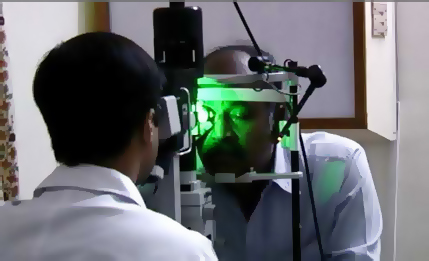A laser is an instrument that produces a pure, high-intensity beam of light energy. The laser light can be focused onto the retina, selectively treating the desired area while leaving the surrounding tissues untouched. The absorbed energy creates a microscopic spot to destroy lesions or weld tissues together. For many patients, laser can preserve or prevent vision loss if given in a timely fashion.

Who needs Laser suregery?
Your eye will almost always look and feel normal with retinal diseases, even when there is hemorrhaging and leakage in the back of your eye. Your sight may also be normal for a while despite the presence of potentially blinding eye problems.
The only way to tell if you need laser surgery is to have a careful, dilated retinal examination, often followed by special testing including OCT scanning and fluorescein angiography (a photographic test that evaluates the eye’s circulation). Lasers are commonly used to treat the following eye conditions:
1. Diabetic retinopathy
Diabetes causes circulation problems throughout the body, including the eyes, nerves, and kidneys. The retinal blood vessels are usually like pipes, bringing blood into and out of the back of the eye. In diabetes, however, the vessels may leak, causing the retina to swell and not work properly (diabetic macular edema). Vision is affected when the swelling involves the central vision area. Laser surgery can seal the leaks, thereby preventing further vision loss.
2. Retinal vein occlusions
The small blood vessels that drain blood from the retina (retinal veins) can sometimes become blocked as part of the aging process. This is more common in patients with diabetes or high blood pressure. A retinal vein occlusion can cause the retina to swell with fluid and blood, blurring central and peripheral vision. Other times, new blood vessels may grow and cause pain with very high pressure inside the eye (neovascular glaucoma). Laser treatment can help reduce this swelling or cause the new blood vessels to disappear.
3. Age-related macular degeneration
Some people will develop aging changes in the macula, the portion of the retina responsible for our central reading vision. Most will experience the less harmful dry type, which usually causes minimal visual changes. The more severe, or wet type, causes the macula to swell with fluid and blood. Symptoms of wet macular degeneration include painless blurred or distorted vision. Urgent treatment can often prevent or delay vision loss in some patients with this wet type.
4. Ocular histoplasmosis
Most people in the Kentuckiana area have been exposed to histoplasmosis, a tiny plant-like organism (fungus) that causes an asymptomatic or viral-type illness early in life. There are often scars left behind in the eye and lungs that usually cause no symptoms. Some patients will develop new blood vessels adjacent to an old histoplasmosis scar. These vessels usually cause painless blurring or distortion. Urgent treatment can control these leaking vessels, often preserving central vision.
5. Retinal breaks and detachment.
The retina lines the back of the eye like wallpaper. Retinal tears or rips can occur as part of an aging phenomenon, or following cataract surgery or eye injury. Patients will often see cobweb-like floaters or light flashes when a retinal tear develops. Liquid that normally fills the central portion of the eye (the vitreous) can leak beneath the tear, lifting the retina away from the eye wall. This is called a retinal detachment, which can cause blindness if left untreated. Laser surgery around retinal tears is often able to weld the retina to the underlying eye wall. This can prevent or limit retinal detachment.
6. Central serous chorioretinopathy (CSC)
CSC consists of one or more “blisters” of fluid (serous detachment) beneath the macula. It can cause central blurriness, distortion, abnormal color vision, blind spots, and temporary farsightedness. Although the vast majority of cases will resolve spontaneously, laser photocoagulation is sometimes necessary for persistent lesions.
7. Ocular tumors
Some patients will have non-cancerous leaking vascular tumors that can cause the retina to swell and not function properly. Laser surgery can destroy these tumors and allow the swelling to go away.
What happens during my surgery?
There are no special preparations before eye laser treatment. You should eat normally and take your regularly prescribed medications before surgery.
Retinal laser surgery is performed in our office. Eye drops will be given to dilate the pupil and numb the eye. The treatment is performed while you are seated in a chair, similar to the one used for regular eye examinations. You will remain awake and comfortable. Treatment is usually painless, although some patients may require a numbing injection for discomfort or sensitivity to the laser light.
The laser treatment usually takes less than 30 minutes to complete, and you can go home immediately following surgery. Arrangements for transportation should be made in advance since you may not be able to drive right away.
What are the restrictions and side effects after laser?
There are virtually no restrictions following retinal laser surgery, and you should be able to resume your normal activities and work schedule the following day.
Most patients notice no vision changes following their laser surgery, although there may be some temporary blurring for several weeks to months. In addition, depending on the condition being treated, some may notice a permanent blind spot or decrease in peripheral and night vision.
Will I need more than one laser treatment?
It will take several weeks to months before we can tell whether the laser surgery has been successful. Many patients, however, will need more than one treatment to control their eye problem and prevent further loss of vision.
![]()
